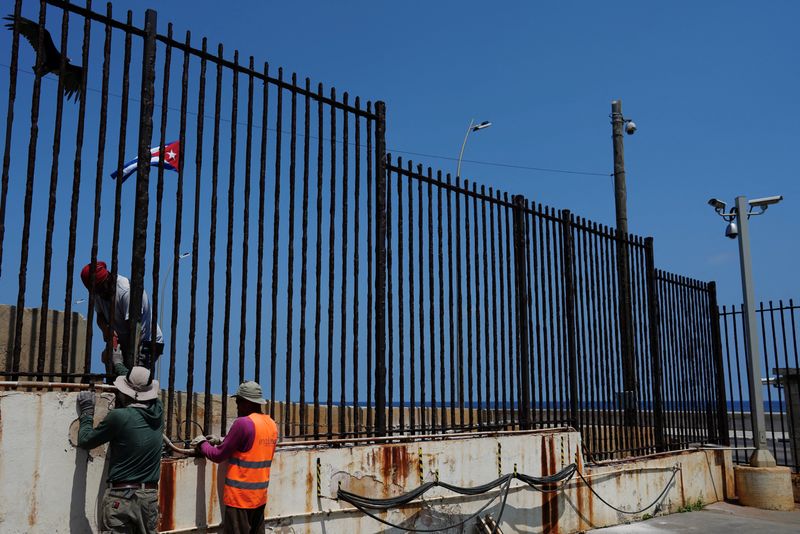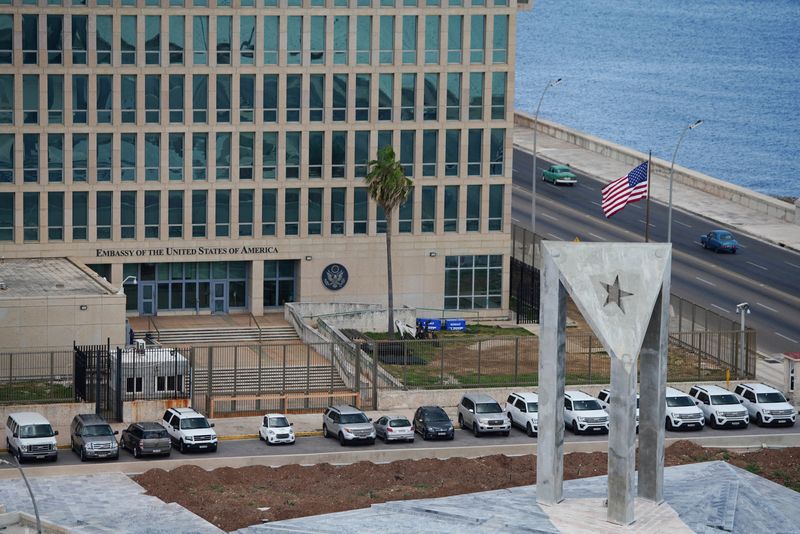By Dave Sherwood
HAVANA (Reuters) -When the U.S. embassy in Havana reopened last May to Cubans seeking visas after a nearly five-year hiatus, the once proud 1950s vintage building was in shambles.
Pieces of its stone facade were crumbling from top floors, threatening passersby. A rusty perimeter fence, decrepit and obsolete, wobbled with the trade winds. Hurricane Irma had damaged lower windows, a guard post, and granite facing. Even the ambassador's dramatic perch - a balcony overlooking the Gulf of Mexico - was deemed unsafe.
A $28 million renovation project now underway is a little-known but critical investment in U.S. diplomacy on the island, which has also included an increase in consular staff and programs to "advance human rights" and private business in the communist-run country.
"The important thing to realize about diplomacy is that it is not only policy - it's logistics," said Benjamin Ziff, the top U.S. diplomat in Cuba. "You need to have a presence. You need to have people. You need to have a building."
But the project also underscores the still rocky relationship between Cuba and the U.S., which flared again earlier this week on a U.S. media report that China had reached a secret deal with Cuba to establish a spy base on the island aimed at the United States.
U.S. officials immediately cast doubt on report, and Cuba on Thursday denied it outright. But the Cuban government also seized the opportunity to accuse the U.S. of being behind a fabrication meant to justify Washington's decades-old economic embargo against the island.
The embassy work, which began in May of 2022 and will likely be delayed six months, until March or April of 2024, according to a State Department source, has stumbled amid tensions and a lack of trust between the two countries.
Cuba's government was initially slow to issue visas for U.S. workers and technicians, Ziff told Reuters.
The work crew's headcount of roughly 12, including five Cubans who are required to be accompanied at all times by U.S. contractors with special security clearances, has fluctuated with those bureaucratic hurdles, the state department source said, prompting unpredictable delays in construction.
If a contractor broke a sawblade, for example, work at times ground to a halt, Ziff said.
"They'd have to return to the United States to procure another sawblade, then apply for a new visa which could take two months," he said.
Other challenges, including high-sulfur Cuban fuel that wreaked havoc on machinery imported from the U.S., and local shortages of supplies such as cement and rebar, initially stalled progress.
Some of those problems have been resolved, Ziff said. The Cuban government has streamlined the visa process for workers. The State Department imported high-grade stainless steel for its fencing, and granite from a quarry in Vermont for the building's new facade.
But new obstacles have cropped up. So-called "secure" containers to transport sensitive building materials, sealed with diplomatic privilege, are now facing bureaucratic delays, according to Ziff and State Department sources.
"There is an understanding that it is good for the bilateral relationship to have an embassy that is safe and secure," Ziff said. "However, trying to bring in materials ... remains a problem."
The Cuban government did not respond to a request for comment on this story.
Cuba has insisted on the importance of a functioning U.S. embassy and a robust visa program, agreed upon in migration accords between the two countries, as a necessary step in stemming the record-breaking exodus of Cubans via irregular routes north to the United States.
Reuters spoke with several Havana residents who applauded the embassy overhaul.
"It's one of the most important embassies in our country, and many Cubans visit it when we want to travel," said Alexander Garcia, a 22-year-old worker at a cafeteria facing the embassy.
"I want it to be in top shape when it's my turn to go," he said, smiling.
CASTRO THREATENED TO SEIZE BUILDING
Under former leader Fidel Castro, the jabs and antagonism often went both ways between Cuba and the embassy.
In 1964, Castro threatened to seize the building and convert it into his government's fishing ministry, angered over the arrest of Cuban fishermen in Florida. Castro often alleged the embassy was a hotbed of spies aiming to overthrow his government.
When the embassy under the administration of George W. Bush began to run a Times Square-style electronic ticker with messages promoting human rights and democracy, Castro planted more than a hundred black flags in a park adjacent to the embassy to obscure the sign from the public.
The embassy was not always a point of contention.
Built on Havana's iconic Malecon seafront promenade in 1953 and designed by Harrison & Abramovitz, the architects who designed the United Nations headquarters in New York, its high-profile location and modernist architecture were intended to make a statement after World War Two, said author Jane Loeffler, a Washington-based architectural historian who studies embassies.
The State Department, she said, saw it as a "way of putting America on the diplomatic map as a forward-looking and optimistic nation, home of the world's largest democracy, a place of welcome and a force for good."
But after Castro took power in 1959 and the two countries severed diplomatic relations, the structure was all but abandoned and that initial show of optimism became a "failed dream," she said.
The building, which operated for years as the "U.S. Interests Section," reopened as an embassy in July 2015 when diplomatic relations were restored under Barack Obama. But its staffing was cut sharply two years later after U.S. personnel began to report a mysterious ailment dubbed "Havana Syndrome."

U.S. intelligence investigations have since determined it "very unlikely" a foreign adversary was responsible for the illness, and a more robust staff and agenda have returned to Havana, Ziff said.
"There's a lot of interesting history here, and we will continue to make interesting history here."
